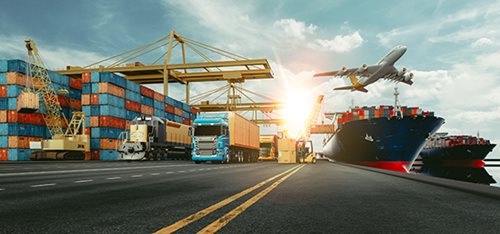 Logistics problems are plaguing the shipment and delivery of goods nationwide. At the October 18 NJTPA Freight Initiatives Committee, members heard that these problems are as not as severe in our region as elsewhere. They also were briefed on air cargo industry efforts to help ease the crisis, as well UPS’s exploration of future maritime shipping options.
Logistics problems are plaguing the shipment and delivery of goods nationwide. At the October 18 NJTPA Freight Initiatives Committee, members heard that these problems are as not as severe in our region as elsewhere. They also were briefed on air cargo industry efforts to help ease the crisis, as well UPS’s exploration of future maritime shipping options.
Anne Strauss Wieder, NJTPA Director of Freight Planning, gave an overview of recent regional freight trends, noting that container activity at the port rebounded strongly beginning last fall and now surpasses pre-pandemic levels. Currently, she said, only three vessels were anchored off the port awaiting berths. This contrasts, she said, with the backlogs at other ports including 25 vessels at Savannah and 80 or more at southern California ports.
Still, she said, freight logistics in the region is hampered by the ongoing worker shortage – particularly truck drivers. She also noted the continued rapid expansion of warehouse facilities in the region.
Committee Chair and Middlesex County Commissioner Charles Kenny introduced speakers Brandon Fried, Executive Director of the Air Forwarders Association, who spoke on the state of the air cargo industry; and Christopher Lutick, Director, State Government Affairs at UPS, who spoke about his company’s initiatives in the NJTPA Region.
Fried said the surge of online buying and demand for goods, has exacerbated problems in the freight industry, including worker shortages, inadequate port infrastructure, shortages of truck chassis at ports and other factors. He said the air cargo industry has played a significant role in addressing the current “overflow of goods in the supply chain.”
While most air cargo has traditionally flown in the bellies of passenger planes, he said the increasing air cargo demands have prompted all major carriers to convert a share of passenger planes to full cargo carriers, loading packages into seats instead of people. United Airlines has run 15,000 of these “passenger freighters,” he said. But he noted congestion at airports and lack of capacity to handle truck traffic due to older infrastructure are limiting air cargo expansion.
Also of great concern, he said, are cybersecurity threats and the need for regulation and enforcement to prevent dangerous goods—particularly carelessly packaged lithium batteries – from being shipped as air cargo, creating potentially “catastrophic” events.
Lutick described an effort by UPS to explore moving truck trailers by barge or high-speed ferry between New Jersey and New York to avoid highway congestion and reduce environmental impacts. Among the locations in New Jersey are Kearny and the new UPS facility to be built in Bayonne at the former Military Ocean Terminal.
He said the concept was tested this summer. One issue was that loading 14 to 20 trailers on a barge required special ramps because of the skirts commonly installed on trailers to reduce wind resistance. This type of trailer transport, he said, operates successfully on Lake Champlain with a dedicated vessel. He said the concept will undergo further development over the next two years.
If the service could accomplish three to four trips per day between New York and New Jersey, he predicted, other companies beyond UPS would be attracted, enabling them “to take advantage of the short hop across the water” to move their goods.
A recording of the meeting and copies of the presentations are available for download.